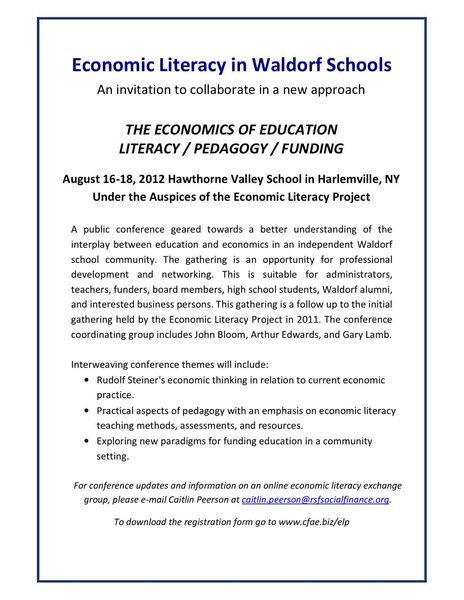Nachrichtenbeitrag
Promoting economic literacy in Waldorf schools
HARLEMVILLE (NNA) - At a time when the economic events precipitated by the banking crisis in 2008 have led many to question the validity of current economic policies and to look for a more ethical approach to finance and business, a conference in America later this year aims to examine ways in which Waldorf schools can help their students to develop greater economic literacy.
“The economics of Education: Literacy/Pedagogy/Funding”, to be held at the Hawthorn Valley School in Harlemville, New York, from 16-18 August, will provide an opportunity for all those involved in Waldorf education, including high school students and business people, to obtain a better understanding of the interplay between education and economics in an independent Waldorf school community.
Themes covered by the conference will include Rudolf Steiner’s economic thinking in relation to current economic practice and practical aspects of teaching economic literacy. The conference will also explore new paradigms for funding education in a community setting.
The conference is part of the Economic Literacy Project initiated by the Economic Literacy Initiative Group comprising John Bloom of RSF Social Finance, Arthur Edwards of the Centre for Associative Economics and Gary Lamb of the Hawthorne Valley Association.
“Waldorf education is in a unique position to instil a conscious approach to economic life by fostering social enterprise and making visible its financial side as preparation for contemporary life,” the Project says on its website.
Economic literacy in Waldorf schools was already discussed at a meeting in August last year to explore the importance of economic literacy in our time, share experiences of teaching and learning the subject, and “to imagine what steps might be needed to take the conversation further”. It brought together educators, people working in the fields of social finance and economics, young Waldorf alumni, and researchers on topics linked to Rudolf Steiner’s insights. This year’s conference is the outcome of that discussion.
The Economic Literacy Initiative Group has been working on the subject of economic literacy in Waldorf schools for a number of years. The importance of economics has grown exponentially in the twenty-first century, it says. It also believes that freedom, one of the central tenants of Waldorf education, should cover more than just freedom of thought or expression but also economic freedom, and therefore children should be educated on matters concerning economics as well.
In the original proposal for the Economic Literacy Project, the Group states that the aims of the project are to “broaden the view of how economics is taught at the high school level in Waldorf schools, develop a strategy for cultivating economic literacy in high schools” and “establish a teaching framework that includes innovative practices based on Rudolf Steiner’s economic and social insights and questions conventional economic thinking”.
Other aims include being able to “engage teachers and students in a collaborative learning process, support those responsible for teaching economics in Waldorf high schools” and to “create a model approach that can influence more widely how economic literacy is taught at the high school or secondary level”. It has also outlined several project processes through which it will be able to achieve these goals.
During last year’s meeting, the gathering covered areas including the overall theme of economic education, the possible structure of courses and content, and methods that teachers of economics could use. The challenges that might arise were also looked at. There was agreement to create a pool of teaching resources, materials and literature.
END/nna/hva/cva
Item: 120516-01EN Date: 16 May 2012
Copyright 2012 News Network Anthroposophy Limited. All rights reserved.

